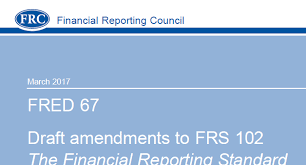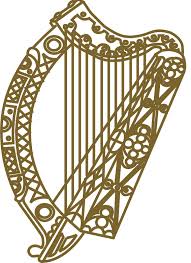
by John McCarthy Consulting Ltd. | Jul 25, 2017 | News
For more on FRS 102 (including the new Section 1A for ‘small’ entities) and the proposed changes in FRED 67 come to our next series of CPD courses in the Talbot Hotel, Stillorgan, County Dublin starting on Monday 27 November 2017. Other courses are also available at Ticket Tailor here.
In its first review since 2013 of the new Irish GAAP, the Financial Reporting Council (FRC) has proposed changes to reporting of investment property, the definition of financial instruments and the treatment of directors’ loans.
It seems hard to believe that FRS 102, the latest version of which is September 2015, was originally published in March 2013. Meanwhile four years later, in March 2017, the FRC published Financial Reporting Exposure Draft 67 (FRED 67), setting out changes to the standard as a result of its first triennial review. FRED 67 contains some significant changes which are expected to become effective from 1 January 2019.
In this first of a two-part blog, we look at one of the main areas most likely to affect our readers.
Investment property
At present, FRS 102 requires that investment property should be measured at fair value through profit or loss, unless obtaining a reliable fair value on an ongoing basis would amount to ‘undue cost or effort’ (interpreted as only rarely applying, where it is practically impossible to locate a valuer), in which case it can be measured at cost. However, this provision has not always been applied correctly in practice.
The exposure draft states that entities may be treating the ‘undue cost or effort’ option as a free accounting policy choice and states clearly that this is not the case. FRED 67 suggests removing the ‘undue cost or effort’ exception entirely, meaning that investment property will always, with one exception, need to be held at fair value. The exception is for property let out to another group member, where the FRED introduces an accounting policy choice between cost/fair value.
Where investment property is partly let out to a group member and partly let out to an external party, the property will need to be split between the two and the externally let portion must be shown at fair value.
The proposals mean that the requirements for investment property accounting will become tougher than they are at present, while there is some welcome relaxation of the requirements in group situations.
Other proposals relate to financial instruments, intangible assets and small entity directors’ loans. We will cover these in another a blog very soon.
It is expected that the updated version of FRS 102 will be published in late 2017 in time for use for accounting periods commencing on/after 1 January 2019, with early adoption expected to be allowed for accounting periods commencing on/after 1 January 2018.
Exposure draft FRED 67
For a copy of the 142-page exposure draft go to this link FRED 67, Draft amendments to FRS 102 Financial Reporting Standard applicable in the UK and Republic of Ireland, Triennial review 2017.
For more on FRS 102 (including the new Section 1A for ‘small’ entities) and the proposed changes in FRED 67 come to our next series of CPD courses in the Talbot Hotel, Stillorgan, County Dublin starting on Monday 27 November 2017. Other courses are also available at Ticket Tailor here.

by John McCarthy Consulting Ltd. | Jun 7, 2017 | News
Statutory Instrument SI 246 of 2017 has been signed into law by the Minister for Jobs, Enterprise and Innovation, Mary Mitchell O’Connor. This instrument means that the Companies (Accounting) Act, 2017 will come into effect on 9 June 2017.
With respect to financial statements and some other reports, the Act will apply to financial periods beginning on or after 1 January 2017. Section 14 of the Act allows for early adoption of certain sections (set out in Section 14), mainly to do with financial statements which may be early adopted for financial years beginning as early as 1 January 2015.
The Statutory instrument is available here: https://www.djei.ie/en/Legislation/SI-No-246-of-2017.html
The Act is available here http://www.irishstatutebook.ie/eli/2017/act/9/enacted/en/pdf
To hear more on this topic, please click here to see our upcoming courses in November 2017

by John McCarthy Consulting Ltd. | May 23, 2017 | News
In this blog, we look at the proposed changes in FRED 67 on financial instruments, intangible assets and small entity directors’ loans.
These changes were published in FRED 67 (by the Financial Reporting Council in March 2017) which the FRC propose to make effective from 1 January 2019.
For more on FRS 102, the proposed changes in FRED 67, and other topics come to our upcoming CPD courses in the Talbot Hotel Stillorgan County Dublin.
Financial instruments
Section 11 of FRS 102 ‘Basic Financial Instruments’, sets out a detailed list of rules for classifying debt instruments as ‘basic’.
If any of these are breached, the instrument is complex (in the language of the standard ‘non-basic’) and must be accounted for under Section 12, Other Financial Instruments Issues, at fair value. These rules do not change in the latest proposals, but the exposure draft does add a new principles-based definition of a debt instrument.
The idea is that more instruments should meet the ‘basic’ definition in future.
Even if an instrument breaches one or more of the rules, it could still be ‘basic’ as long as it falls within that definition.
The idea is that more instruments should meet the ‘basic’ definition in future and ‘non-basic’ instruments will end up being, typically, those where there is some exposure to something unusual or unrelated. It also means, though, that a greater degree of judgement will be needed when assessing financial instrument classification.
Intangible assets
Intangible assets in a business combination are currently separated out from goodwill if they either arise from legal or contractual rights, or if they are separable. This was a change from old UK GAAP, which required both of these criteria to be met. In FRED 67, the FRC is reverting to the old GAAP approach, although it does allow an alternative accounting policy choice, where all intangibles can be separated out as long as they are reliably measurable and have a probable chance of future economic benefits.
This seems to offer a reasonable amount of flexibility, but it is an ‘all or nothing’ approach: either all intangibles are split out, all the time, an approach more similar to IFRS, or they are split out relatively rarely, as under old UK GAAP. If this amendment is approved, the decision as to which policy to apply will depend not only on the accounting but also other areas, especially the tax implications.
Small entity directors’ loans
The accounting required for intragroup and other related party loans has been a source of difficulty since FRS 102 was first issued.
Currently, where a loan is made on an non-market basis, it is necessary to identify an equivalent market interest rate and use that to discount the cash flows to present value. However, the FRC received feedback raising concerns about how practical it is to obtain a market rate, particularly for small entities that would not otherwise be able to access funding. There is also a question as to how relevant the accounting treatment is, especially for owner-managed businesses.
The exposure draft proposes that small entities are not required to find a market rate of interest where they have borrowings received from director shareholders or close family of the director shareholders i.e. credit loans. Instead they can just use the transaction price. This exemption only extends to directors who are ‘natural persons’, so loans with corporate directors would not qualify for the exemption. It is our understanding that this relief will also be allowed to ‘small’ entities that choose not to use Section 1A of FRS 102, as long as they qualify as ‘small’.
Any other related party loans – intragroup loans and so on – still need to be accounted for at present value using the market rate. Small entities will still need to disclose these transactions though, as non-market transactions with directors and their family are caught by the related party disclosure requirements in Section 1A.
Reacting to early feedback received the Financial Reporting Council have already published an interim relief measure for directors from 8 May 2017. The measure announced applies to credit loans only. The FRC has clarified that the interim measure will not apply to loans from small companies to their directors/shareholders i.e. debit loans.
Readers may want to send feedback to the FRC, before the deadline of 30 June 2017, asking for this relief to be extended to debit loans i.e. loans from the company to director/shareholders, as they are just as common as debit loans.
Retrospective restatement
Any change in accounting policy resulting from a change in the requirements of a Financial Reporting Standard (FRS) needs to be accounted for in accordance with the transitional provisions, if any, specified in that amendment. Where there are no transitional provisions, any changes in accounting policy need to be applied fully retrospectively (i.e. from the beginning of the comparative period), to the extent practicable.
FRED 67 contains a couple of transitional provisions relating to intangible assets previously separated out in a business combination and investment property, which is let out to another group entity. The remaining changes seem to need to be applied fully retrospectively. The FRC may amend this when it issues the final set of amendments, but this is not certain.
Future developments
The FRC aims to issue the amendments in final form by late 2017. The plan is that the amendments will apply for periods beginning on or after 1 January 2019, but early adoption will be available once they are finalised, so if the simplifications suit, it could be possible to adopt them for 2017 year ends. If any amendments are adopted early, all amendments must be adopted early.
In FRED 67, the focus has clearly been on making FRS 102 more straightforward and easier to apply in practice. The next stage of the triennial review will focus more on alignment with IFRS and particularly on implementing some of the big changes that are currently affecting IFRS adopters, namely, revenue recognition, financial instruments and leases.
Whether and how these areas are applied to FRS 102 remains to be seen, but it will no doubt be a substantial task for the FRC. At least this second stage will not be effective until 2022, though, so there is plenty of time to consult on and consider these changes.
Closing date for feedback
FRED 67 is open for comment until 30 June 2017. Comments on the proposals should be sent to ukfrs@frc.org.uk.
Exposure draft FRED 67
For a copy of the 142-page exposure draft click here FRED 67, Draft amendments to FRS 102 Financial Reporting Standard applicable in the UK and Republic of Ireland, Triennial review 2017.
For more on FRS 102, the proposed changes in FRED 67, and other topics come to our upcoming CPD courses in the Talbot Hotel Stillorgan County Dublin.

by John McCarthy Consulting Ltd. | May 23, 2017 | News
New guidance has been published in the UK on how and when auditors should report matters to charity regulators. This is an important change in the relationship between auditors and the charities regulator – covering matters that would not have been explicitly reported on previously.
The guidance applies when reporting to the Charity Commission for Northern Ireland and covers both auditors and independent examiners. It also deals with charities regulated across the UK. It applies when an audit report is signed off on/after 1 May 2017 and covers a range of matters outlined below.
It is perhaps only a matter of time before these areas are also covered by regulatory reporting requirements in the Republic of Ireland.
There are nine key areas that must be reported:
- Where there are concerns that conflicts of interest and related party transactions have not been properly managed or declared;
- Where an audit report is modified, or contains an emphasis of matter paragraph (such as for going concern);
- Failure(s) of internal controls, including matters of governance, that resulted in, or could result in, loss or risk to, charitable funds or assets;
- Matters suggesting dishonesty or fraud involving loss, or risk to, charitable funds or assets;
- Evidence that the charity’s activities put its beneficiaries at risk of abuse or mistreatment;
- Breaches of legislative requirements, including charitable funds being misapplied;
- Evidence of a deliberate or significant breach of an order or direction made by a charity regulator;
- Knowledge or suspicion that the charity, trustees, employees or assets have been used to support terrorism; and
- Knowledge or suspicion that charitable funds have been used for money laundering.
For more on this and other topics affecting charities in Ireland, come to our next CPD event on 30 November 2017.
Booking and further details are available here
Other courses are available at Ticket Tailor here

by John McCarthy Consulting Ltd. | May 22, 2017 | News
Commencement date
The Companies (Accounting) Act, 2017 was signed into law by the President on Wednesday 17 May 2017 as No 9 of 2017, but as of today Tuesday 23 May 2017, is not yet published as an Act on the Irish Statute Book website – operated by the Attorney General at http://www.irishstatutebook.ie/eli/acts.html. During the Dáil debates on the Bill it was mentioned that the commencement of certain sections of the legislation would be back-dated to periods commencing 1 January 2016 and 1 January 2015 in some cases.
Periods commencing 1 January 2015 is of little use to companies at this stage as most, if not all, have filed their financial statements for the year ended 31 December 2015. Hopefully it will be back-dated at least to 1 January 2016 to allow companies that qualify avail of the new audit exemption and ‘small’ company thresholds as well as the new Micro Entities regime (essentially operated by the use of the FRS 105 accounting standard).
Care is needed when availing of the Micro Entities regime as it cannot be used by:
- Charities;
- Regulated entities such as financial institutions and insurance intermediaries and
- Entities that prepare consolidated financial statements (see page 100 of FRS 105).
Additional care is also required as financial statements prepared under FRS 105 are deemed to give a true and fair view. Therefore, adding any additional notes beyond what’s required in the standard may be a risky approach and could jeopardise the true and fair concept.
In recommending FRS 105 to clients, accountants should caution them that while directors’ salaries no longer need disclosed under the Micro Entities regime, the financial statements need few notes (except in certain limited circumstances)! It may take some convincing for third parties like lending institutions and suppliers, upon which the business depends for credit, that FRS 105 is a credible regime, if one is looking for credit.
FRS 102 (Section 1A) may be a more suitable standard to apply for ‘small’ entities as it comes with a ready-made suite of notes and accounting policies that explain the financial statements better and most critically of all, add significant credibility to the accounts.
Name of new legislation
Section 1 of the new Act states: ‘This Act may be cited as the Companies (Accounting) Act, 2017’. Presumably together with the earlier legislation that it partly amends, both pieces of company law may be cited as the ‘Companies Acts 2014 to 2017’.
For more on this and other courses see our next company law event on 29 November 2017 here
Other courses are available at Ticket Tailor here









